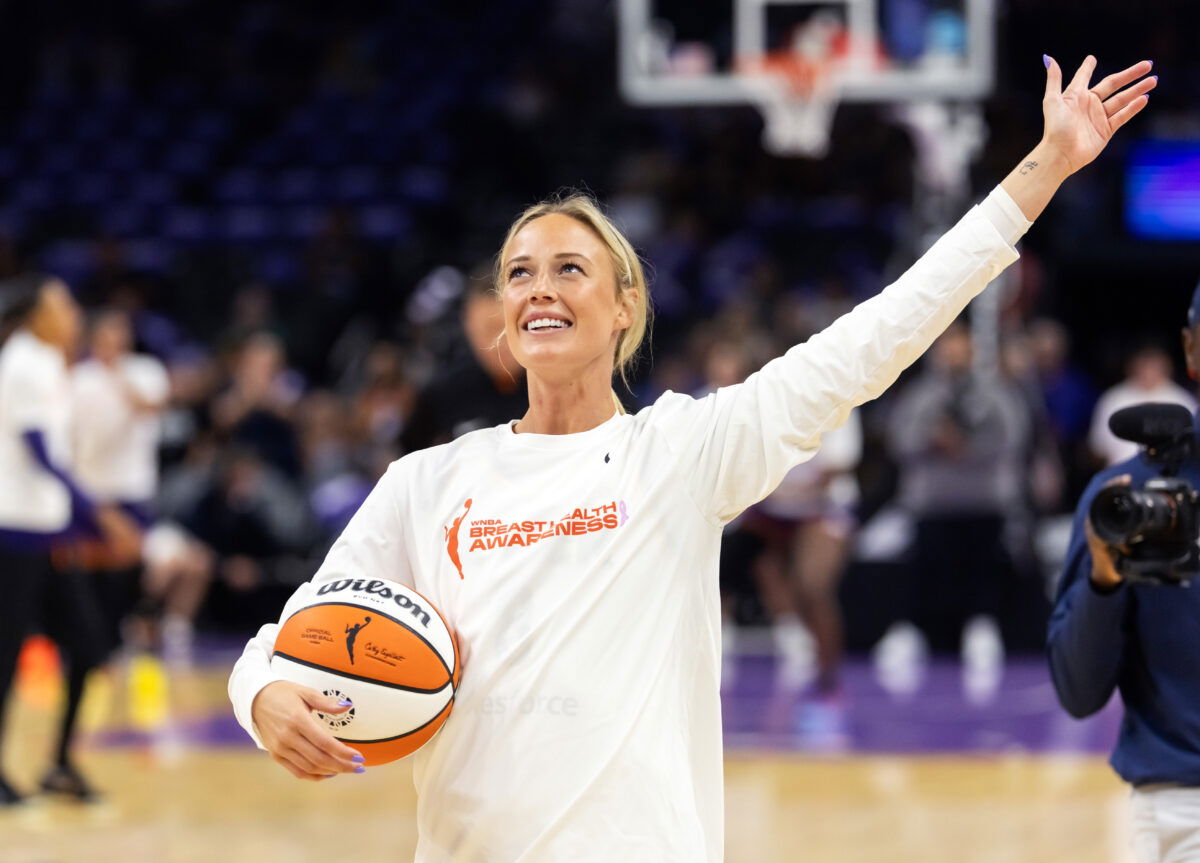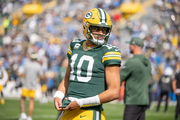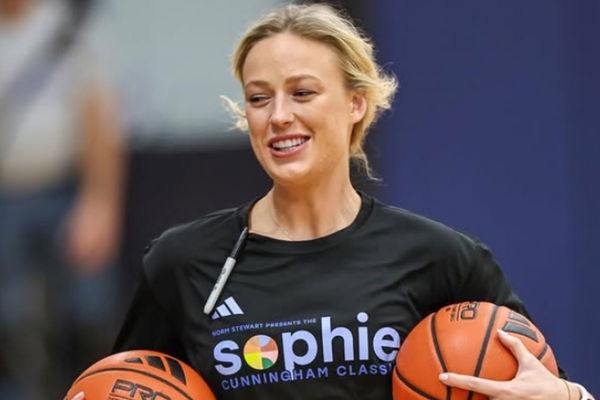
Imago
Credit: IMAGO

Imago
Credit: IMAGO
Sophie Cunningham is on the rise! Months after tearing her MCL in her first season with the Indiana Fever, the veteran guard’s offseason just took a surprising, and potentially career-altering, turn, and it’s all linked to Project B.
Watch What’s Trending Now!
Project B first surfaced earlier this year as a new global basketball league looking to make a major splash with a series of men’s and women’s tournaments beginning next winter that showcase “the best basketball in the world,” according to co-founder Grady Burnett. But as Cunningham joins the league as the latest addition, one question has been on everyone’s mind: What is this league? How much is Cunningham getting paid?
ADVERTISEMENT
What is Project B in the WNBA?
Founded by former Facebook executive Grady Burnett and Skype co-founder Geoff Prentice, Project B is a new global basketball league aiming to redefine how elite women’s basketball is played as well as paid. With more than 3 billion basketball fans worldwide, the league aims to tap into the market beyond the WNBA and NBA’s current reach.
The women’s league will feature six teams, each carrying 11-player rosters, competing in a traditional 5-on-5 format. But instead of being tied to specific cities, Project B will operate on a traveling-tournament model. The league plans to host seven two-week events across Europe, Asia, and Latin America, with the first women’s season scheduled to run from November 2026 to April 2027. However, while the men’s league will launch later, both will share host locations.
Top Stories
Fired John Harbaugh Announces News for Giants & Browns as Ex-Ravens HC Confirms Stance on NFL Job – Report

PGA Tour Confirms Brooks Koepka’s Return but It Comes With $85M Punishment

Ravens Make Matt Nagy Announcement as John Harbaugh Makes Feelings Clear on Next NFL HC Job

NASCAR 2026 Championship Format Explained: Points System, Bonuses, Stages & More

Jordan Love Confirms Feelings on Matt LaFleur’s Firing Rumors After Contradicting HC Over Bears Loss

Josh Jacobs Confirms Position on Matt LaFleur Firing After Packers HC Puts All Blame on Locker Room

But the area where this upcoming league immediately stands out is compensation. Players will receive equity stakes in addition to salary, a model mirroring the rise of athlete-ownership trends. According to reporting from Front Office Sports, women’s contracts will reach seven figures and start at $2 million, far beyond the WNBA’s current supermax. While the league has not confirmed exact salary numbers, they’ve emphasized that pay will exceed both WNBA salaries and Unrivaled’s 2025 structure.
ADVERTISEMENT
The league also has backing from major investors, including Candace Parker, Steve Young, Novak Djoković, and Sloane Stephens, as well as venture firms like Mangrove Capital and Quiet Capital. They will also partner with Sela, an entertainment company owned by the Saudi Public Investment Fund, to handle global event operations.
ADVERTISEMENT
Sophie Cunningham’s reason for joining Project B
For the Fever guard, Project B represents more than just another offseason opportunity; it’s a chance to bet on a new global vision for women’s basketball while securing the kind of payday the WNBA simply can’t match today. Even after the ongoing tussle between the WNBA and WNBPA, the league is no way near matching this type of compensation, leaving the players unimpressed.
Opening up about her reason to join the league, Sophie Cunningham, in an announcement shared by Project B, said, “Excited to join Project B’s athlete roster as they launch a new chapter in women’s basketball. Our game is exploding in popularity, and I’m all in on carrying that momentum forward in any way I can, both at home in the US and beyond.”
PLAYER. PARTNER. OWNER. Sophie Cunningham
“Excited to join Project B’s athlete roster as they launch a new chapter in women’s basketball. Our game is exploding in popularity, and I’m all in on carrying that momentum forward in any way I can, both at home in the US and beyond.”… pic.twitter.com/1alEG4u9MQ
— PROJECT B (@projectb_global) November 25, 2025
ADVERTISEMENT
“I am so thrilled for it. It is giving women’s basketball a platform that is much deserving; not only here in the United States, but across the world. So come on this journey with us,” she further added in an Instagram video shared by the league’s official page.
And well, her enthusiasm isn’t surprising. Just days earlier, Cunningham made it clear she’d strongly consider Project B for one simple reason: the money. In an interview, she said, “If people are going to be paying you multi-million dollar deals, why would you not?”
With reported offers starting at $2 million, Project B simply presents a deal too substantial for a player to ignore.
ADVERTISEMENT
What this could mean for women’s basketball and Cunningham’s career
Sophie Cunningham’s move comes at a time when tensions between the WNBA and the WNBPA regarding CBA negotiations just keep rising, risking a potential lockout, and more than 100 players, Cunningham included, are set to hit free agency this winter. For players like her, this opportunity is not just a financial upgrade; it’s leverage, which can help her in her dealings with the team she joins next, and the discussion around pay. And she isn’t alone. Stars like Nneka Ogwumike, Alyssa Thomas, Jonquel Jones, and Jewell Loyd have already committed to the league, with many more next in line.
For women’s basketball, the implications will run even deeper. For decades, the WNBA and EuroLeague dominated the calendar. Now with Athletes Unlimited, Unrivaled, and Project B all in the mix, players finally have multiple avenues to control their earning power and global visibility. Loyd described it as “an investment in what’s possible,” while Jones emphasized the appeal of facing elite competition around the world. That global reach is exactly what Project B is banking on. But this raises an uncomfortable question!
ADVERTISEMENT

Imago
Credit- Sophie Cunningham Classic’ Instagram
If players can earn millions overseas, what incentive is there to risk injury in the WNBA, where pay is substantially lower? And the answer to that can be uncomfortable as well, because the players wouldn’t. Even in the past, Diana Taurasi once skipped an entire WNBA season at the request of a Russian club, where she was paid over $1 million to play. And a similar pattern could re-emerge if CBA negotiations fail to satisfy the players.
But there are risks for Project B, too. While the season wouldn’t overlap with the WNBA, it does with other offseason leagues, and the absence of city-based teams may test fan loyalty. Still, with unprecedented salaries and a growing list of marquee names, the league has positioned itself as the most disruptive force women’s basketball has seen in years.
ADVERTISEMENT
If the league delivers on its promises, it could mark a turning point not just for Sophie Cunningham but for women’s basketball as a whole. At the same time, Project B’s rise underscores a broader shift in the sport: elite players now have alternatives beyond the WNBA, giving them leverage in negotiations and the ability to prioritize both earnings and career longevity.
Ultimately, women’s basketball is no longer confined to a single league or a single season. With high-profile players chasing both pay and global exposure, the sport is evolving rapidly, and the WNBA would have to catch up.
ADVERTISEMENT
ADVERTISEMENT
ADVERTISEMENT

